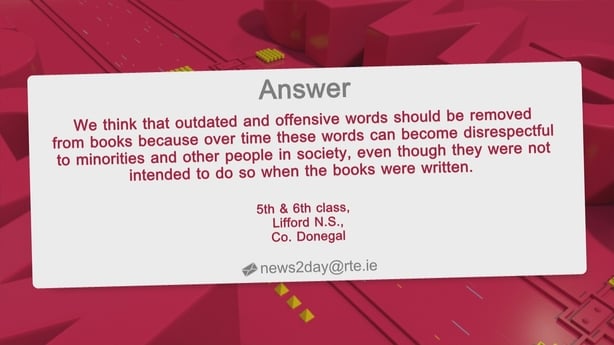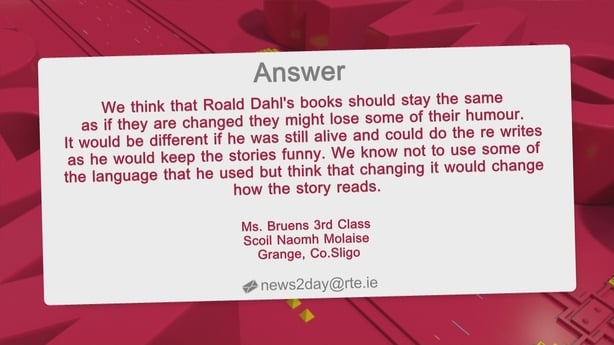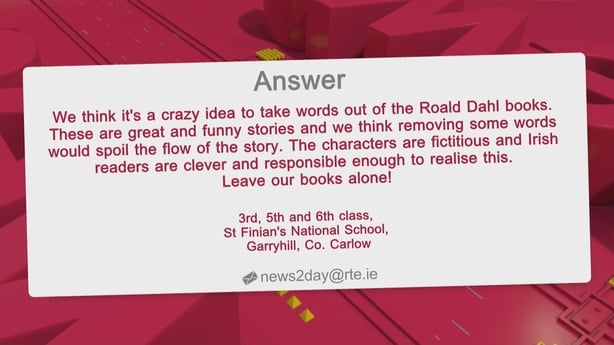Following recent news that Roald Dahl's publishers have amended the latest editions of the late author's books to remove words they think may be considered offensive, news2day decided to ask the children of Ireland what they thought of this.
Teachers and pupils across the country shared their views via email and they certainly had a lot to say.
There were a few responses that were in favour of the books being amended, such as Ms Casey's 3rd class in Sacred Heart National School in Aughrim, Co Wicklow, who said:
"Some people in our class think they should be changed because if children hear words like ugly and fat being read out of the book they might think it's ok to say those words to other people."
The 5th and 6th classes from Lifford National School, Co Donegal agreed:
"We think that outdated and offensive words should be removed from books because over time these words can become disrespectful to minorities and other people in society, even though they were not intended to do so when the books were written."
But the vast majority of emails received were strongly against any changes to the author's work, with many children thinking of the author, how he's not around and how it may be disrespectful to his work.
Mr Fogarty's 5th class in Patrician Primary in Newbridge, Kildare said:
"We should not police literature, particularly when an author like Roald Dahl is no longer here. It's a matter of choice and respect. We don't have to read books we disagree with. We also think if people can't cope with a word like ugly then they are in for a shock when they go online or use social media!"

Ms Duignan's 5th Class in Sooey National School in Sligo said:
"The language is meant to be fun and not offensive, changing it will make the books bland. The author is not alive to make the decision; it changes his legacy, and it might upset his family. The language is not aimed at the people reading it and refers only to a character. Children need to be exposed to these words at some stage and better to be in a fictional story. Changing the language could change the character and personality of the character completely, and book sales might reduce because the books are not the same."
Though many thought of the author, lots of children were also thinking about the stories, and how changing them may ruin them.
Ms Byrne's 6th class in Bunscoil Chríost Rí in Turners Cross in Cork agreed:
"We don't think any words should be changed in books. The writers worked hard on the books, and you may change the story or characters by removing words. The books rarely have pictures, so these words help us as readers to visualise. We also think that if you are going to be offended by words in a book then you should not be reading it."

Ms Ormonde's 3rd and 4th class in Scoil Íosa in Ballina, Co Mayo said:
"We think that the words should be left as they are because they are adjectives used to describe the people in the stories. We think these words have become offensive because of people using them in a nasty way. Roald Dahl did not use them in a nasty way. We don't think changing descriptive words in stories will solve the problem, encouraging everybody to be kinder in their words to each other is a better solution."
Ms Grace's 6th class in Scoil Bhríde National School in Rathdowney, Co Laois said:
"We think that people should enjoy the books for what they are and to realise that these 'offensive' words aren't being directed at anyone in particular. We feel that society has changed over the past number of years and there are bigger issues in the world to worry about."

And Ms Walsh's 3rd and 4th Class in Glenbeg National School in Co Waterford came up with a unique and simple solution:
"We think that books should be left as they are because if they are changed, they are not original and as funny. Tadgh came up with a good idea - Authors could write a warning at the beginning of the book to say that there may be offensive words in the book. At least people would be aware of some outdated or offensive words before they begin reading the book."
Regardless of their standpoint, it's clear that the children of Ireland have very strong opinions on this matter.







